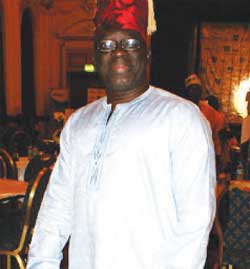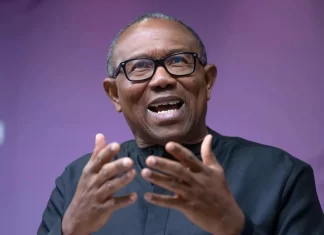Tunji Sotimirin is popular as the Onikonkere of Konkere. He teaches acting and play directing among other courses to do with theatre practise at the University of Lagos (UNILAG), Akoka, Nigeria. He is one of the few academics popular for doing things outside of the four walls of the university classroom. Only late last year he directed the Thespian Family Theatre production of Ola Rotimi’s The God’s are not to Blame and has been in numerous films and television productions. In this interview with Assistant Life Editor, TERH AGBEDEH, he talks about his experience and so much more.
You are one of the university dons who still has time to practise a profession; how do you do that?
Well, I think one has been able to merge the two because of basically the kind of training that one had. The kind of training that I had prepared me for a town and gown experience, to be able to fuse the experiences of the academia and the one that you explore on the field. So, to me, it is not anything difficult, in fact, you are more prepared than those who concentrate on the theory or one aspect of it. What I am saying is that the foundation of your training is key to the practise and that is why it is easy for me.
Is it that foundation that is responsible for your being on television, film and stage?
Absolutely, you see, stage is the big umbrella under which all this other components would come. Film, television, radio, commercials, jingles and stuff, any aspect of the arts that come under stage; when you then zero in on a particular one you begin to look at the principles that will guide each one of them. So, it is the training basically.
Because you do all this, do you have a social life at all?
I anchor social events, weddings, engagements, birthday parties, even burial ceremonies, book presentations; I see all of these activities as still exhibiting the kind of training that you have. So those are the moments and times when I have time to socialise. I feel sometimes there is no time to go and deliberately prepare that you are going out for a party because you are all of the time engaged in practising as an anchor person, as a television and radio presenter as an aspect of the holistic practise that you are exposed to or that you have been trained to do. So, I don’t socialise; if going to anchor events is what you consider as socialising, I would say that in that wise I socialise on the job.
How different are the challenges on stage, television and film?
The two have their own challenges but for stage, you just rehearse and rehearse for like one or two months just to get it ready because the whole idea is that you don’t want to go and make unnecessary mistakes before a live audience because you have one chance so to say. So if you miss that chance people would have an impression of you for life. But for television and film, you have all the time in this world to cut, to shoot and edit so you don’t necessarily need to rehearse for too long. So the camera would do the magic; zoom in and zoom out, clear all the mistakes and even put some effects to help realise the vision of the writer and also the concept of the acting, directing and every aspect of it. Everything can be easily achieved, the technical, the artistic, through the medium of television and film. But stage is a ‘one chance’ and all of the effort will be pumped in during the preparatory stage, which is the rehearsal.
For television and film, we record in cosmopolitan areas like Lagos, and face some challenges like NEPA (electricity), transportation, the location itself is one big issue. So these are the challenges that you face for television. Coupled with the fact that some people will pick up the script and they are otherwise engaged doing other things while you are expecting them at the location and they don’t turn up at the right time.
You had what could be described as a traumatic experience in The Netherland; would you like to share that?
It was at the Schiphol airport. I was doing a performance in the Republic of Ireland that I had just completed and I was coming back home so I had to pass through Schiphol airport to connect my flight to Lagos. So there was this queue that I was on and an immigration officer said to me, ‘let’s see what you have’. Normally, of course you would have to show what you have and they would search you. I said, ‘go ahead and search me but my bom bom is very precious to me’.
See the way you are laughing but he didn’t find it funny.
He didn’t get the joke.
Apparently, he didn’t find it funny. Some other Nigerians who saw me were like, ‘don’t you know him?’ But the man was not smiling at all; everybody kept quiet. Suddenly, he said to me, ‘pull to one side’. He asked me to repeat what I had said and he called the security officer, dogs, guns and held the plane for so long a time and delayed the flight. At the end of the day, I was arrested, put in a cell and all that. What they now said to me is that going to bomb the airport! I said I was a performer, an artiste, a comedian blah blah blah and I don’t intend to do what they (insinuated). I was made to pay a fine of 500,000 euros. When I got to Nigeria, a professor of law said to me that there are two things I need to do; ‘go to the journalists in Nigeria and hold a press conference to correct this impression that you wanted to bomb the airport. They need to sort of apologise for maltreating you because you are a lecturer, you are known and have good records.’
So, I went through the press to correct that and I also wrote The Netherland embassy to express my disappointment and disaffection, we were exchanging correspondences for about six months or thereabouts. Of course, it was taking my time, I had to do other things but at the end of the day they said they were not going to apologise so they threw the case away. But some other people still felt that I should pursue it. I met one or two lawyers in London and they said, ‘since you have been able to travel to a Schengen country like Germany; even after that I have been to Germany, I have not been to Nederland itself but even that same year or so, I went for a conference in Germany. So there was no issue concerning that.
Apart from the fine and keeping you in a cell overnight, was there anything else?
No, that was all.
They didn’t blacklist you, for instance, say you can’t come to our country anymore?
They didn’t say that. The irony was that on the paper they gave me said, ‘okay, you have been deported’. How can you deport someone who is going to his country? That is the thing that baffles me; coming from the Republic of Ireland, passing through Netherland to Lagos and you say you deport me. I was still going via my normal route so what is deportation in that situation? It wasn’t a pleasant experience but it is one of those things. Professor Wole Soyinka and co felt, anytime he saw me he would joke and laugh about it, of course, they all felt that one should not be making such remarks at any airport because it is a very sensitive issue. So it is a great lesson for everyone to learn. And I know a lot of people have been through those kinds of situations. Even as I speak to you some people are going through it; particularly the way they perceive artistes, they are suspicious when you are passing through immigration. But it was a good experience at least for me.
500,000 euros is a lot of money.
Of course, all of the money that I made during my trip, they just collected everything. But some people still feel that I should go and pursue the case. But I want to believe that the officer himself is limited in terms of education.















